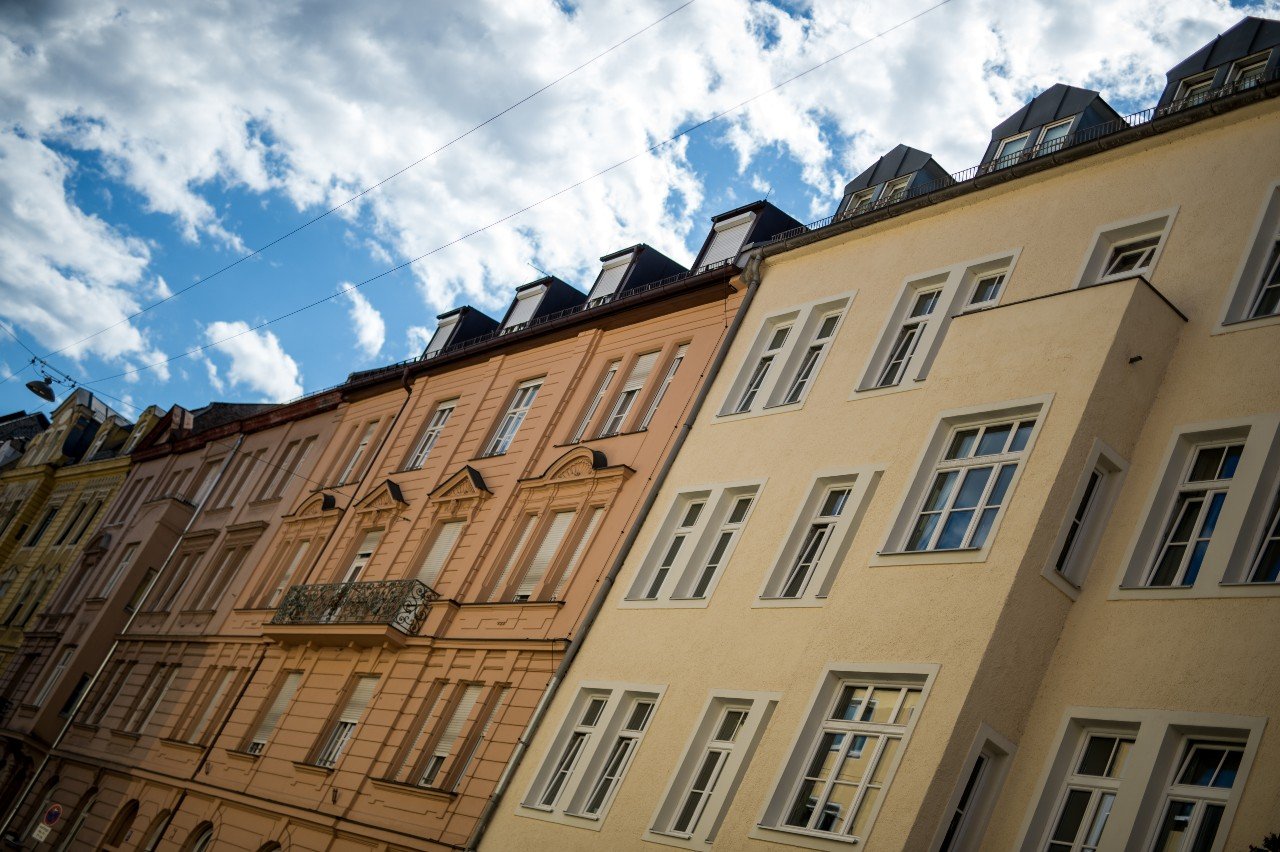REVEALED: How the cost of renting in Germany compares to home ownership

A recent study has shed light on the average monthly costs of renting a property vs buying in Germany - with surprising results.
Looking to move? Find your next rental apartment here.
To buy or not to buy - that is the question. What once may have seemed like an obvious choice for people with financial capital to spare has more recently become a much harder decision.
In Germany, where home ownership is traditionally far lower than in neighbouring countries, people who made it onto the housing ladder have often been at a financial advantage.
Not only did they have a potential safety net for later in life, but they also enjoyed years of lower interest rates that meant their monthly housing costs stayed relatively low compared to the over-heated rental market.
However, according to a new study from the German Economics Institute (IW) on behalf of property firm Accentro, high interest rates have turned this scenario on its head.
In 2023, IW reported, around three quarters of regions saw renters pay less for their housing on average than their home-owning counterparts. This marked a sharp turnaround from the advantages home owners enjoyed in 2022.
What was the cost of renting vs buying in 2022?
Despite the turbulent economic climate back in 2022, buyers in the majority of German regions lived more cheaply than renters in the same area.
In 328 of the 401 regions and cities studied, owners paid an average of €10.04 per square metre for their housing compared to €10.90 for renters in similar properties.
READ ALSO:
- REVEALED: The German regions where property prices are falling and rising the most
- Why is home ownership in Germany so low?
It's worth pointing out that these were renters on new contracts, or those with the most current pricing - so there could well have been renters enjoying much cheaper rents locked in at older rates.
Nevertheless, the results were clear: home owners saved an average of eight percent on their housing last year in most areas - and the savings were even more dramatic on the outskirts of major cities and in the countryside.
In several boroughs of Berlin, where housing is scarce and demand is high, buyers had a 20 percent cost advantage over renters, with similar figures in Hamburg and Bremen. In Frankfurt meanwhile, buyers saved 13 percent compared to renting.
Nationwide, however, the best places to be a home owner were the districts of Sömmerda in Thuringia, Jerichower Land in Saxony-Anhalt and Oder-Spree in Brandenburg.
"We can observe the highest cost advantages in the suburbs of metropolises and large cities as well as in rural areas," emphasised IW real estate expert Michael Voigtländer.
And in 2023?
As you might imagine, the steep rise in interest rates has had a huge impact on the housing market.
In fact, the higher cost of borrowing could even be felt in 2022, when the costs for home owners more than doubled compared to 2021.
According to IW, rock-bottom mortgage rates meant the average buyer in Germany was paying just €4.23 per square metre for their property two years ago, compared €10.30 for renters with new contracts.

Flats in Munich's historic city centre. Photo: picture alliance / Matthias Balk/dpa | Matthias Balk
This more than doubled to €10.04 in 2022, while renters saw a far less dramatic increase to €10.90 per square metre.
In 2023, the upwards trend in interest rates has continued. Instead of the typical 2.65 percent interest rate over ten years used in 2022, the IW calculated costs for the first half of 2023 on the basis of a 3.7 interest rate.
READ ALSO: EXPLAINED: What you need to know about buying property in Germany
The results painted a very different picture of the benefits of renting vs buying. This time, in three quarters of the regions surveyed (301 out of 401), renters paid less for their housing on a monthly basis than buyers.
That's partly because of the number of hidden costs associated with buying a home, which IW factored into its analysis. For example, people purchasing a home in Germany have to pay land transfer tax, notary costs and commissions, and they also lose interest on the amount they invest in a home that could have been invested elsewhere.
Nevertheless, there are still some regions where home ownership is still cheaper in the long run than renting, the institute noted.
Should people rent rather than buy?
The question of whether to buy in Germany may no longer be as clear-cut as it used to be - but that doesn't mean the answer is an automatic 'no'.
In fact, the authors of the Accentro study expect inflation to fall further in the second half of the year, which would raise the likelihood of the European Central Bank (ECB) once again cutting interest rates and making construction cheaper.
With an interest rate cut, the attractiveness of owner-occupied housing should get a boost, said Accentro CEO Lars Schriewer. However, buyers would have to pay attention to economic and socio-demographic developments. "Automatic price increases are no longer guaranteed," he added.
The authors calculated three possible scenarios in the latter half of 2023.

Flats near the Frauenkirche in Dresden. Photo: picture alliance/dpa | Sebastian Kahnert
In the "rapid recovery" and "medium recovery" scenarios, interest rate cuts come at the end of 2023 and in the first quarter of 2024 respectively and massively reduce the costs for home owners. In the "stagnation" scenario, interest rates would remain the same despite falling inflation. Here, buyers would only reap rewards after 2024 - largely thanks to rising rents.
READ ALSO: EXPLAINED: The hidden costs of buying a house in Germany
However, the authors emphasise that these are simply model calculations and that buying a home is a personal decision.
For example, while some people may value their own home as a way to save for retirement, others may find it inconvenient if they move regularly for work. In addition, some may value being independent of a landlord, while others may prioritise being debt free and avoiding expensive repairs or upgrades.
Consumer advice agency Stiftung Warentest says the question "buy or rent?" depends on multiple factors, such as the development of rent and property prices in the future. "There is no certainty," a spokesperson told DPA.
Since a half-percent change in interest can make a huge difference, the agency recommend would-be buyers run through various scenarios using an online calculator.
Nevertheless, IW notes that residential property in Germany is a relatively stable in value compared to other European countries. Even in times of economic turbulence, prices in the Bundesrepublik fluctuate less than in Great Britain, France and the Netherlands, for example.
READ ALSO: Ask an expert: Is now a good time to buy property in Germany?
Comments
See Also
To buy or not to buy - that is the question. What once may have seemed like an obvious choice for people with financial capital to spare has more recently become a much harder decision.
In Germany, where home ownership is traditionally far lower than in neighbouring countries, people who made it onto the housing ladder have often been at a financial advantage.
Not only did they have a potential safety net for later in life, but they also enjoyed years of lower interest rates that meant their monthly housing costs stayed relatively low compared to the over-heated rental market.
However, according to a new study from the German Economics Institute (IW) on behalf of property firm Accentro, high interest rates have turned this scenario on its head.
In 2023, IW reported, around three quarters of regions saw renters pay less for their housing on average than their home-owning counterparts. This marked a sharp turnaround from the advantages home owners enjoyed in 2022.
What was the cost of renting vs buying in 2022?
Despite the turbulent economic climate back in 2022, buyers in the majority of German regions lived more cheaply than renters in the same area.
In 328 of the 401 regions and cities studied, owners paid an average of €10.04 per square metre for their housing compared to €10.90 for renters in similar properties.
READ ALSO:
- REVEALED: The German regions where property prices are falling and rising the most
- Why is home ownership in Germany so low?
It's worth pointing out that these were renters on new contracts, or those with the most current pricing - so there could well have been renters enjoying much cheaper rents locked in at older rates.
Nevertheless, the results were clear: home owners saved an average of eight percent on their housing last year in most areas - and the savings were even more dramatic on the outskirts of major cities and in the countryside.
In several boroughs of Berlin, where housing is scarce and demand is high, buyers had a 20 percent cost advantage over renters, with similar figures in Hamburg and Bremen. In Frankfurt meanwhile, buyers saved 13 percent compared to renting.
Nationwide, however, the best places to be a home owner were the districts of Sömmerda in Thuringia, Jerichower Land in Saxony-Anhalt and Oder-Spree in Brandenburg.
"We can observe the highest cost advantages in the suburbs of metropolises and large cities as well as in rural areas," emphasised IW real estate expert Michael Voigtländer.
And in 2023?
As you might imagine, the steep rise in interest rates has had a huge impact on the housing market.
In fact, the higher cost of borrowing could even be felt in 2022, when the costs for home owners more than doubled compared to 2021.
According to IW, rock-bottom mortgage rates meant the average buyer in Germany was paying just €4.23 per square metre for their property two years ago, compared €10.30 for renters with new contracts.

This more than doubled to €10.04 in 2022, while renters saw a far less dramatic increase to €10.90 per square metre.
In 2023, the upwards trend in interest rates has continued. Instead of the typical 2.65 percent interest rate over ten years used in 2022, the IW calculated costs for the first half of 2023 on the basis of a 3.7 interest rate.
READ ALSO: EXPLAINED: What you need to know about buying property in Germany
The results painted a very different picture of the benefits of renting vs buying. This time, in three quarters of the regions surveyed (301 out of 401), renters paid less for their housing on a monthly basis than buyers.
That's partly because of the number of hidden costs associated with buying a home, which IW factored into its analysis. For example, people purchasing a home in Germany have to pay land transfer tax, notary costs and commissions, and they also lose interest on the amount they invest in a home that could have been invested elsewhere.
Nevertheless, there are still some regions where home ownership is still cheaper in the long run than renting, the institute noted.
Should people rent rather than buy?
The question of whether to buy in Germany may no longer be as clear-cut as it used to be - but that doesn't mean the answer is an automatic 'no'.
In fact, the authors of the Accentro study expect inflation to fall further in the second half of the year, which would raise the likelihood of the European Central Bank (ECB) once again cutting interest rates and making construction cheaper.
With an interest rate cut, the attractiveness of owner-occupied housing should get a boost, said Accentro CEO Lars Schriewer. However, buyers would have to pay attention to economic and socio-demographic developments. "Automatic price increases are no longer guaranteed," he added.
The authors calculated three possible scenarios in the latter half of 2023.

In the "rapid recovery" and "medium recovery" scenarios, interest rate cuts come at the end of 2023 and in the first quarter of 2024 respectively and massively reduce the costs for home owners. In the "stagnation" scenario, interest rates would remain the same despite falling inflation. Here, buyers would only reap rewards after 2024 - largely thanks to rising rents.
READ ALSO: EXPLAINED: The hidden costs of buying a house in Germany
However, the authors emphasise that these are simply model calculations and that buying a home is a personal decision.
For example, while some people may value their own home as a way to save for retirement, others may find it inconvenient if they move regularly for work. In addition, some may value being independent of a landlord, while others may prioritise being debt free and avoiding expensive repairs or upgrades.
Consumer advice agency Stiftung Warentest says the question "buy or rent?" depends on multiple factors, such as the development of rent and property prices in the future. "There is no certainty," a spokesperson told DPA.
Since a half-percent change in interest can make a huge difference, the agency recommend would-be buyers run through various scenarios using an online calculator.
Nevertheless, IW notes that residential property in Germany is a relatively stable in value compared to other European countries. Even in times of economic turbulence, prices in the Bundesrepublik fluctuate less than in Great Britain, France and the Netherlands, for example.
READ ALSO: Ask an expert: Is now a good time to buy property in Germany?
Join the conversation in our comments section below. Share your own views and experience and if you have a question or suggestion for our journalists then email us at [email protected].
Please keep comments civil, constructive and on topic – and make sure to read our terms of use before getting involved.
Please log in here to leave a comment.